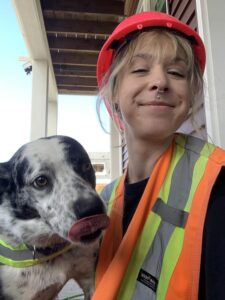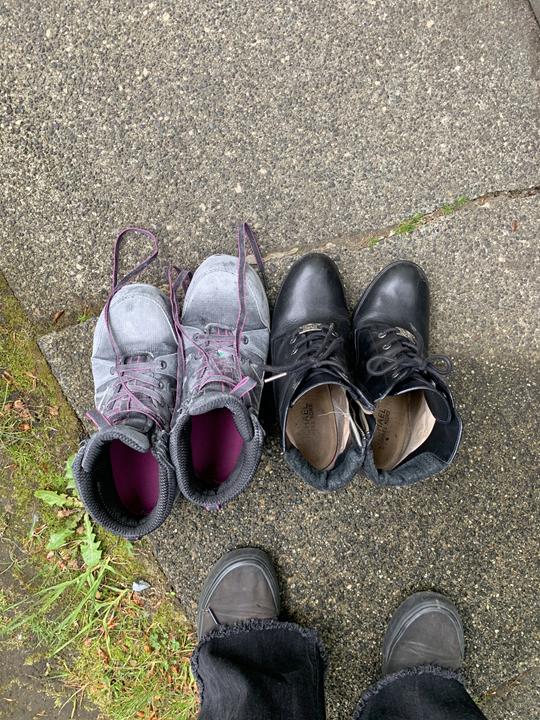It took me a while to even be ready to get back into the job market— every fibre of my being was resisting the non-profit world. So, when a friend’s mom offered me a job as a finishing labourer with her company, I took the leap and bought those boots. The starting wage was higher than any non-profit job I had previously worked at, but I didn’t know what to expect the first day I showed up on site. Unsurprisingly, I was one of about four women on the ground. Having grown up in a family where all the men worked in trades, I wasn’t too worried about my ability to do the job. I’d been doing labour work with them since I was nine-years-old, and while I may not be as strong as a 200-pound man, I do have a fierce desire to prove myself.
I loved it. I loved that I was left alone for most of my day, I loved that I was outside, moving, smelling fresh air. I loved that I didn’t have to don stuffy office clothes, engage in dull small talk, that I didn’t have to be overly nice to anyone. I especially loved my pink hard hat. After I received my first pay cheque, I was pissed. Not because it wasn’t adequate or because I got ripped off — it’s because despite working part-time, I was making more money than I had at a job I spent four years working toward. My bachelor of arts degree was pulling in pennies compared to the wages that I was getting at the property development company; and I looked around, and saw almost no women. In fact, the British Columbia Construction Association noted that in 2024, women comprised only 5.7 per cent of the construction labour force.

My arts degree with a specialization in sociology did pay off in one way — my gender wage disparity alarm was ringing. No wonder women earn 17 per cent less than men in B.C., no wonder so many women stay in unhealthy relationships for financial reasons, no-freaking-wonder women experience poverty at higher rates than men do. According to the Canadian Women’s Foundation, “In 2019, average individual income for women was $43,010, compared to $60,680 for men.” That’s absolutely outrageous to me.
After this glorious first pay cheque, I started looking into wages for jobs in construction. Of particular interest was the HEO certificate: a heavy equipment operator. I’m not talking about a forklift here, I’m talking about the big stuff — the loaders, the dozers, the graders, the scrapers, the mother flipping bulldozers. And I’d be raking in over $70,000 a year. My research led me to my alma mater: the University of the Fraser Valley, that offers a number of trades programs, but sadly, not an HEO certificate. However, there are tons of grants, bursaries, and scholarships for women in trades. If you’re interested in checking out the amazing opportunities, funding, resources, and support available to you, check out the BC Centre for Women in the Trades.
But Darien — you are surely asking — aren’t construction sites full of toxic masculinity? Won’t I be at risk of sexual harassment? Let me tell you, I got hit on more at my customer services jobs than I ever have in construction. Moreover, in service jobs, you still have to be nice to those people. In construction, I could tell so-and-so to eff right off with no repercussions. Luckily, I was never really put in a position where I felt uncomfortable. The men I worked with were problematic in their own ways, but I generally experienced nothing but respect from them. That’s not to say that sexual harassment and even assault doesn’t happen in the field — that’s a very real issue — but my theory is that if more women enter the field, the less likely any of us are to be harassed. So this is my battle cry, ladies: why can’t we be the modern day suffragettes of construction and mechanics? Take off those heels and turn that smile upside down! We’re labourers now.
Darien Johnsen is a UFV alumni who obtained her Bachelor of Arts degree with double extended minors in Global Development Studies and Sociology in 2020. She started writing for The Cascade in 2018, taking on the role of features editor shortly after. She’s passionate about justice, sustainable development, and education.


